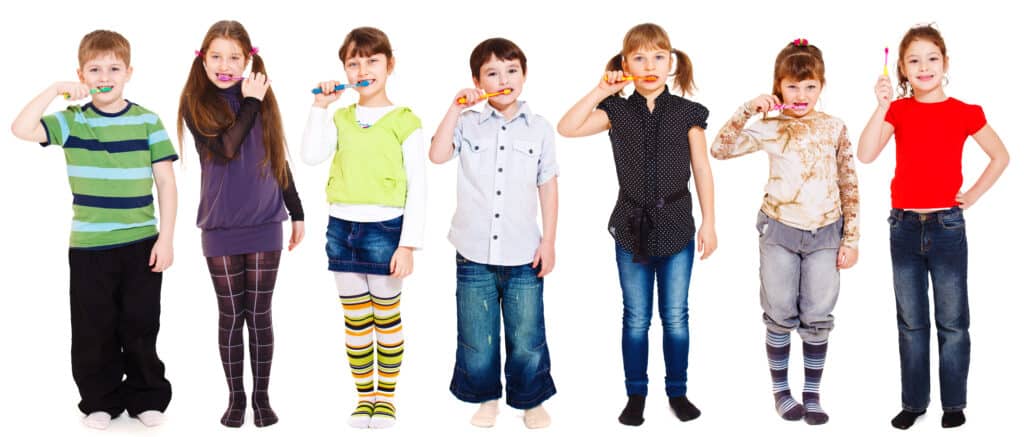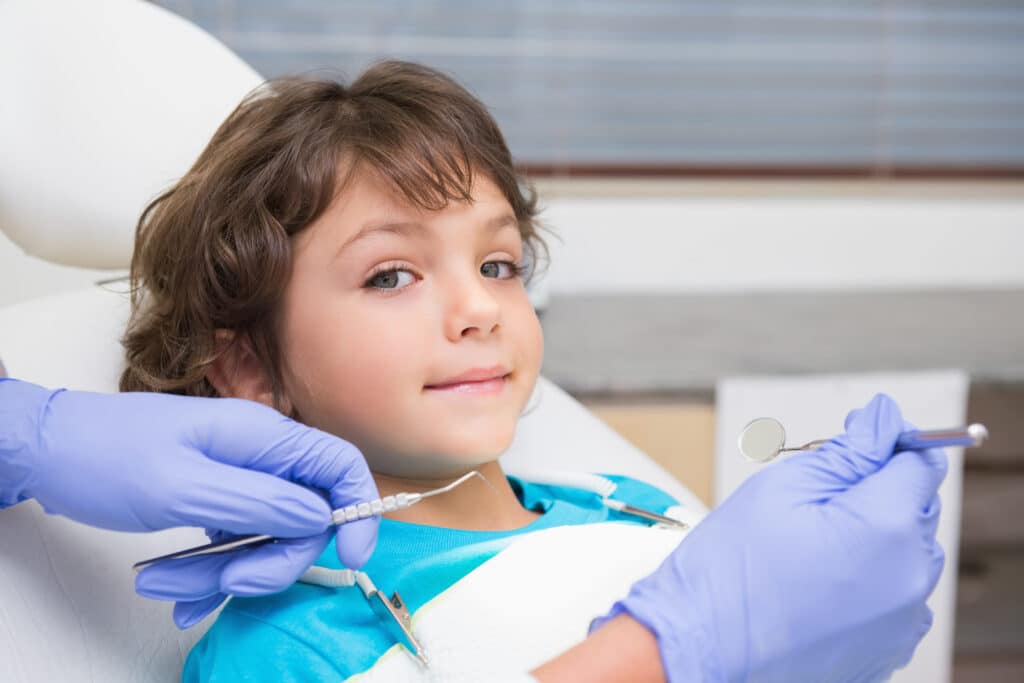7 Tips to Find the Best Dentist for Your Oral Health Needs
June 19, 2025

August 1, 2023
From singing “Twinkle, Twinkle, Little Star” to receiving prizes at the dentist’s office, dental care for children is often more interesting that it is for adults. It also has a unique set of hurdles and challenges, but these don’t have to take caregivers by surprise. By exploring this list of common questions about dental care for children, we aim to make the process more accessible.

Teething is a painful process for everyone involved. A baby’s first teeth don’t usually come in quietly, but afterwards, children adapt fairly quickly. Parents should start looking for their child’s first teeth around six months. It is common for the central incisors (the two lower front teeth) to come through first, followed by the upper central incisors. The rest of the teeth don’t usually follow a pattern, but it is common for all 20 to have surfaced by the time the child is two or three.
The best dental care for children younger than three is to use a toothbrush specifically designed for infants. These have small heads and soft bristles, so they are gentle with the baby’s gums and tongue. At least once a day—usually at night—brush the teeth that have emerged gently to remove any plaque-causing bacteria.
It is common, at least in the United States, for parents to encourage their children to leave their dislodged baby teeth under their pillows for the tooth fairy to buy. While this tradition isn’t particularly relevant for dental care for children, it is good for their emotional health if they have fears about losing their teeth.
The origins of the tooth fairy are pretty obscure, made even more so by the fact that so many cultures have their own variant (in France, for example, Le Petite Souris, a little mouse, apparently comes and collects the teeth). Human fascination with lost teeth spans nearly as long as history itself, so we may never know how our fae friend came to be.

Thumbsucking and pacifier use, while beneficial for distraught volume levels, work in opposition to good dental care for children. Thumbsucking has been linked to crooked and crowded teeth and problems with bite. Parents should do what they can to help their children break such a habit before it ruins their teeth. If the proclivity remains after permanent teeth have arrived, an orthodontist or dentist may need to recommend a corrective appliance.
When a child is still in infancy, brushing with water is sufficient for cleaning new teeth. Parents should start introducing children to the use of toothpaste around the age of three to avoid too much fluoride in the children’s systems. When toothpaste enters the picture, parents should supervise brushing and only use a pea-sized amount.
The effects of fluoride include stronger bones and teeth. However, when too much fluoride is ingested, the reverse is true. The effects of fluoride are compounded in children, so part of dental care for children is maintaining the levels they are exposed to. Waiting to use toothpaste and supervising brushing are good tools in a parent’s arsenal.
The amount of radiation received during a dental x-ray exam is extremely small when proper precautions like high-speed film and lead aprons are used. Pediatric dentists are also especially cautious to ensure that dental x-rays present no harm to children. Poor dental hygiene is more likely to be harmful than x-rays.

Occasionally, dental care for children may require general anesthesia or sedation. The American Academy of Pediatrics (AAP) and the American Academy of Pediatric Dentistry (AAPD) monitor such procedures rigidly. Every time a child is sedated, at least two people must be present who have life support training: a dental anesthesiology professional and an independent observer.
They’re just going to fall out, right? Why go through the trouble of filling them in the event of cavities? Thorough dental care is necessary even in temporary teeth because no one tooth is a closed system. The health of every aspect of the mouth affects all other aspects. In order to prevent infection, pain, gum disease, rot, further cavities, and premature tooth loss, baby teeth should be treated with the same amount of care as are permanent teeth.
2797 U.S. 89 #201
Pleasant View, UT 84414
| Monday | 8 AM - 5 PM |
|---|---|
| Tuesday | 8 AM - 7 PM |
| Wednesday | 8 AM - 7 PM |
| Thursday | 8 AM - 7 PM |
| Friday | 8 AM - 3 PM |
| Saturday | 8 AM - 12 PM |
| Sunday | Closed |
Proudly accepting new patients from: Pleasant View, North Ogden, Harrisville, Farr West, Marriott-Slaterville, Ogden, Plain City, South Willard, Willard and Perry!
© 2025 | Mountain View Dental | All Rights Reserved | Accessibility | Anti-Discrimination | Healthcare Disclaimer | HIPAA Privacy Policy | Privacy Policy | Terms | XML Sitemap | Sitemap | Site by PDM
